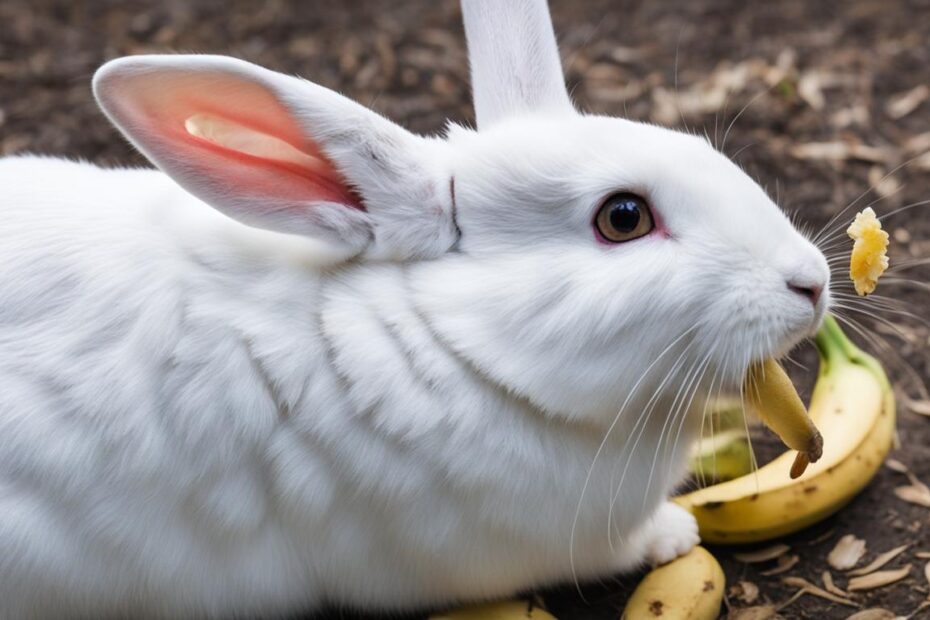If you’ve ever witnessed your mischievous rabbit gobbling up an entire banana in one go, you’re not alone. Rabbits are generally allowed to eat a small amount of bananas as an occasional treat. Feeding your rabbit large amounts of banana and banana peel can be dangerous for your rabbit. Whether or not you should be concerned if your rabbit ate a whole banana depends on factors like size, strength, habits, and the size of the banana itself. Signs that your rabbit may not be well after eating a whole banana include lack of appetite, diarrhea, bloating, and lethargy. If your rabbit appears fine after eating the banana, there is likely no cause for concern. However, it’s important to take precautions to prevent this kind of accident in the future.
Key Takeaways:
- Rabbits can eat small amounts of bananas as an occasional treat.
- Feeding rabbits large amounts of banana or banana peel can be dangerous.
- Monitor your rabbit for any signs of illness after they eat a whole banana.
- Take precautions to prevent your rabbit from accessing large quantities of bananas.
- The staple of a rabbit’s diet should always be hay, with fruits and vegetables offered as occasional treats.
Can Rabbits Eat Bananas?
While bananas may seem like a tasty treat for your furry friend, it’s important to understand their role in a rabbit’s diet. Rabbits can eat bananas, but it should be done in moderation and as an occasional treat. Let’s take a closer look at why.
Bananas are naturally high in sugar, which can be harmful to rabbits if consumed in excess. Their primary diet should consist of hay, fresh water, and a balanced rabbit pellet or mix. Fruits, including bananas, should only account for a small portion of their overall nutritional intake.
When feeding your rabbit bananas, it’s essential to remove the peel and wash the fruit thoroughly. Pesticides and other chemicals may be present on the peel, which could be harmful to your bunny’s health. By taking these precautions, you can ensure your rabbit’s safety and well-being.
It’s important to monitor your rabbit’s response to bananas. Some rabbits may have sensitive digestive systems and may experience digestive issues if given too much fruit. If you notice any signs of digestive upset, such as diarrhea or bloating, it’s best to reduce or eliminate bananas from their diet.
Bananas can be a tasty and nutritious addition to your rabbit’s diet, but they should never replace the fundamental components essential for their well-being. Always remember to prioritize hay, water, and a high-quality rabbit pellet or mix.
Here’s a helpful table that outlines the nutritional value of bananas for rabbits:
| Nutrient | Amount per 100g |
|---|---|
| Calories | 96 |
| Sugars | 17.2g |
| Fiber | 2.6g |
| Potassium | 358mg |
| Vitamin C | 8.7mg |
| Vitamin B6 | 0.4mg |
As you can see, while bananas contain beneficial nutrients such as fiber, potassium, and vitamins C and B6, they are also high in calories and sugars. This is why feeding bananas to rabbits should be limited to small, occasional servings.
In conclusion, rabbits can eat bananas as a treat, but it’s crucial to do so in moderation. Make sure to remove the peel, wash the fruit thoroughly, and monitor your rabbit’s response. Remember, a healthy rabbit diet consists primarily of hay, fresh water, and a balanced pelleted food. Consult with a veterinarian for personalized advice on how to provide the best nutrition for your furry friend.
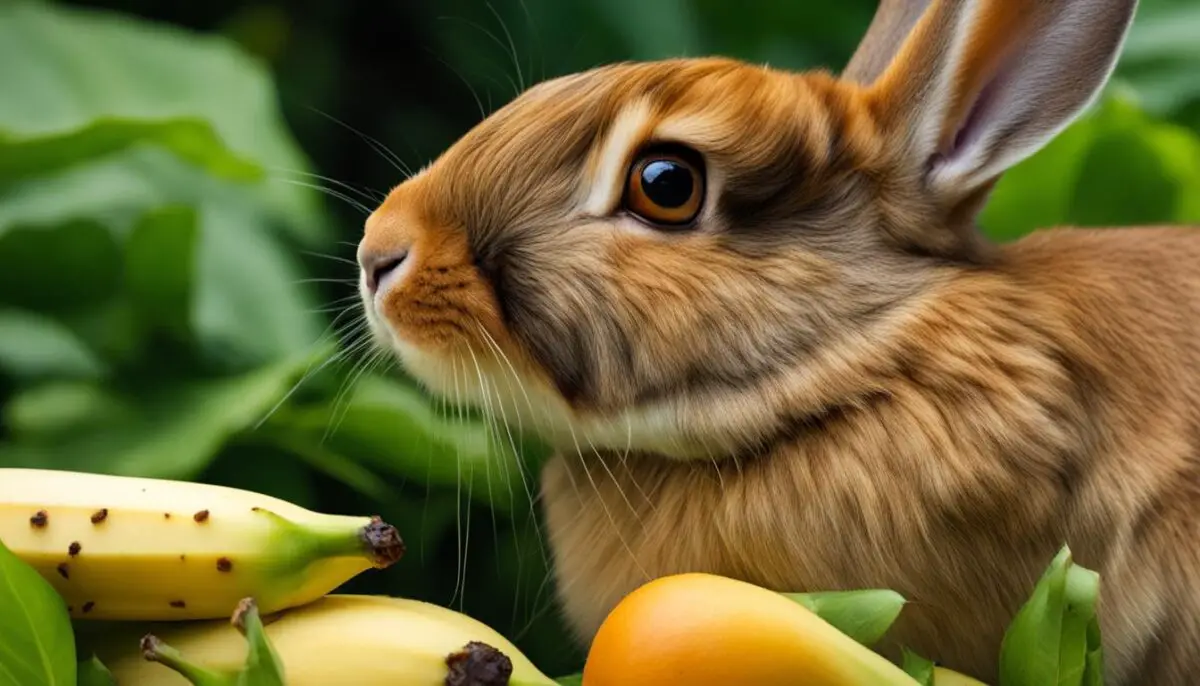
References:
- “Nutrition: What is a Rabbit’s Diet?” House Rabbit Society
- “Feeding Your Rabbit.” Blue Cross
- “Bananas for Rabbits – Safe Fruits?” Rabbit Hole Hay
Nutritional Value of Bananas for Rabbits
When it comes to rabbit nutrition, it’s essential to understand the value that different foods bring to their diet. Bananas, while not a staple food for rabbits, do offer certain nutritional benefits as a treat. Let’s take a closer look at the nutritional value of bananas for rabbits.
Key Nutrients in Bananas
Bananas are packed with various nutrients that can contribute to a rabbit’s overall health. Here are some key nutrients found in bananas:
- Calories: Bananas are a relatively high-calorie fruit, providing energy for rabbits.
- Sugars: Although bananas contain natural sugars, they should only be given as an occasional treat due to their high sugar content.
- Fiber: Fiber is important for a rabbit’s digestive health, and bananas contain a moderate amount of dietary fiber.
- Protein: While rabbits primarily obtain protein from sources like hay and leafy greens, bananas do offer a small amount of protein.
- Potassium: Bananas are rich in potassium, which helps support proper muscle function in rabbits.
- Vitamin C: This essential vitamin plays a crucial role in a rabbit’s overall health and immune system.
- Vitamin B6: Bananas also contain vitamin B6, which aids in various bodily functions.
It’s important to note that while the natural sugars in bananas may appeal to rabbits, they should only be given as treats due to their high sugar content. The bunny’s primary diet should consist of hay, fresh water, and a balanced mix of rabbit pellets and fresh vegetables.
Remember, moderation is key when it comes to feeding rabbits any treats, including bananas. Too much sugar in a rabbit’s diet can lead to potential health issues such as obesity, dental problems, and gastrointestinal imbalances. Always consult with a veterinarian if you have any specific concerns about your rabbit’s diet or nutrition requirements.
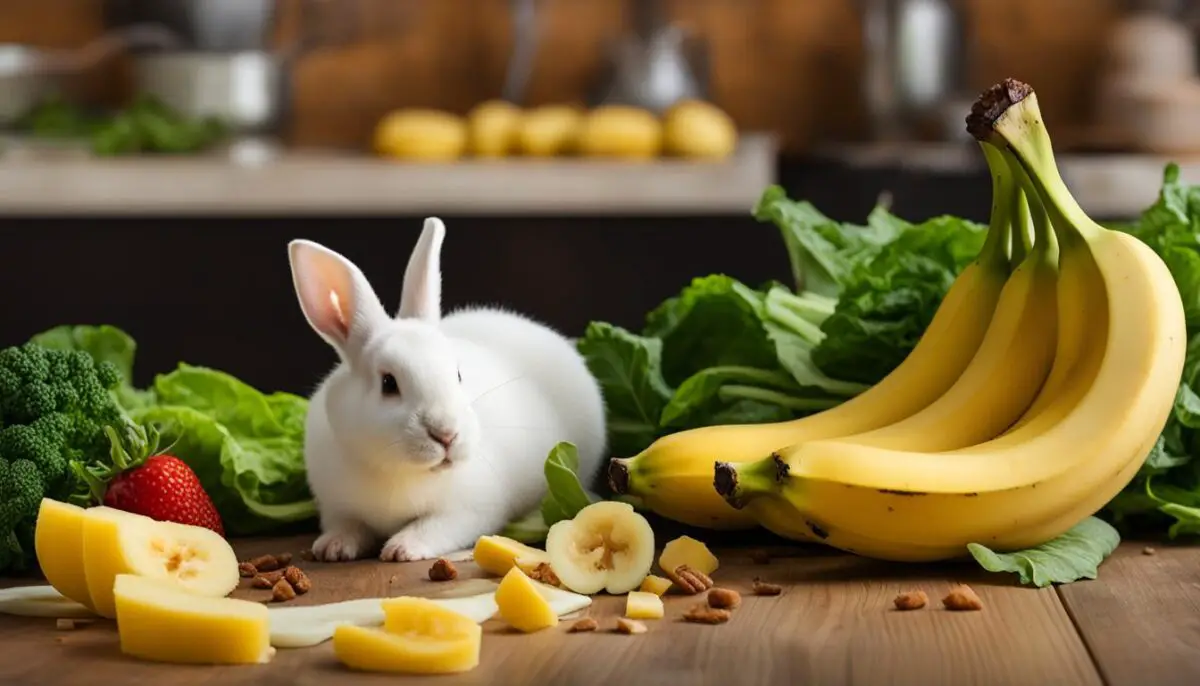
Moderation and Portion Control
Moderation is key when it comes to feeding rabbits bananas. While bananas can be a delightful treat for your furry friend, it’s important to practice portion control to ensure a healthy rabbit diet. Adult rabbits should be given no more than two small slices of banana per week. Baby bunnies, on the other hand, should wait until they are older before being introduced to bananas.
When offering bananas to your rabbit, remember that the staple of their diet should always be hay. Hay provides essential fiber and helps maintain proper digestion. While bananas can add variety to their diet, they should be limited to occasional treats.
“A small slice of banana, no more than two times a week, is sufficient as a treat for adult rabbits.”
To help you visualize the recommended portion for your rabbit, refer to the table below:
| Rabbit Type | Frequency | Portion Size |
|---|---|---|
| Adult Rabbits | No more than twice a week | Small slice of banana |
| Baby Bunnies | Wait until older | Avoid introducing bananas |
Remember, it’s essential to observe your rabbit’s response to bananas. If you notice any signs of digestive upset or discomfort, it’s best to consult with a veterinarian for further guidance.

Feeding your rabbit a healthy and balanced diet is crucial for their overall well-being. In addition to hay and occasional treats like bananas, make sure to provide a variety of fresh, rabbit-safe fruits and vegetables to promote a nutritious diet.
Other Fruits and Vegetables for Rabbits
Incorporating a range of fruits and vegetables into your rabbit’s diet can provide them with essential vitamins and minerals. Some safe options for rabbits include:
- Cucumbers
- Celery
- Grapes
- Cabbage
However, it’s important to introduce new foods gradually to prevent any digestive issues. Pay close attention to how your rabbit reacts to each food and adjust their diet accordingly.
Ultimately, maintaining a healthy rabbit diet involves striking the right balance between staple foods like hay, occasional treats like bananas, and a variety of other rabbit-safe fruits and vegetables.
Other Fruits and Vegetables for Rabbits
In addition to bananas, there are several other fruits and vegetables that rabbits can enjoy as part of their diet. These options provide a variety of flavors and nutrients to keep your bunny happy and healthy.
Here are some safe choices:
- Cucumbers: Cooled cucumber slices are a refreshing and hydrating snack for rabbits.
- Celery: This crunchy vegetable can be given in small pieces as a treat.
- Grapes: Be sure to remove any seeds before offering your rabbit a few grapes.
- Cabbage: This leafy green can be given in moderation as part of a balanced diet.
When introducing new foods to your rabbit, it’s important to do so gradually. Start with small portions and observe your bunny for any signs of digestive upset, such as diarrhea or bloating. If your rabbit tolerates the food well, you can continue to include it as part of their diet.
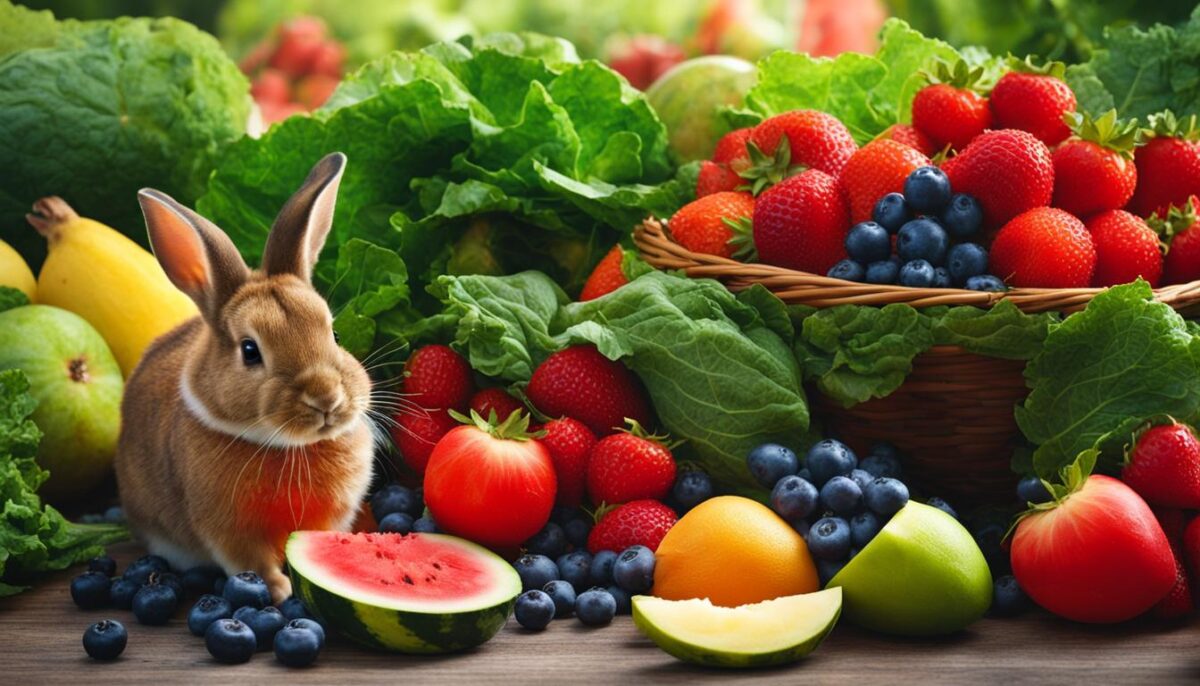
Rabbit Diet – Fruits and Vegetables Comparison
| Food | Benefits | Quantity |
|---|---|---|
| Cucumbers | Hydrating, low in calories | 1-2 slices per day |
| Celery | Crunchy, low in calories | A few small pieces as a treat |
| Grapes | High in water content, a source of antioxidants | A few grapes, without seeds, 1-2 times per week |
| Cabbage | Rich in vitamins and fiber | A small amount, once or twice a week |
Remember to always offer fruits and vegetables in moderation. The main components of a rabbit’s diet should be high-quality hay and fresh water. Consult with your veterinarian to ensure that your rabbit’s diet is well-balanced and meets their nutritional needs.
The Importance of Hay in a Rabbit’s Diet
While fruits like bananas can be a delightful treat, hay should always be the mainstay of a rabbit’s diet. Hay ensures proper digestion and provides the necessary fiber for a healthy bunny.
Rabbits have a unique digestive system that requires a high-fiber diet to keep their gut healthy. Hay is a crucial component of a rabbit’s diet as it helps maintain their dental health, prevents gastrointestinal issues, and promotes proper digestion.
There are several types of hay that are suitable for rabbits:
- Timothy hay: This is the most popular and widely available type of hay for rabbits. It has a high fiber content and low calcium, making it a great choice for adult rabbits.
- Meadow hay: Meadow hay is a mixture of different grasses and herbs, providing rabbits with a variety of flavors and textures. It is also rich in fiber and nutrients.
- Orchard grass hay: Orchard grass hay is another nutritious option for rabbits. It is high in fiber and low in calories, making it suitable for rabbits that need to watch their weight.
To ensure your rabbit’s health, it is important to provide a constant supply of fresh hay. Hay should be available at all times and should make up the majority of your rabbit’s diet. Fresh water and a small portion of rabbit pellets can also be given, but these should be secondary to the hay.
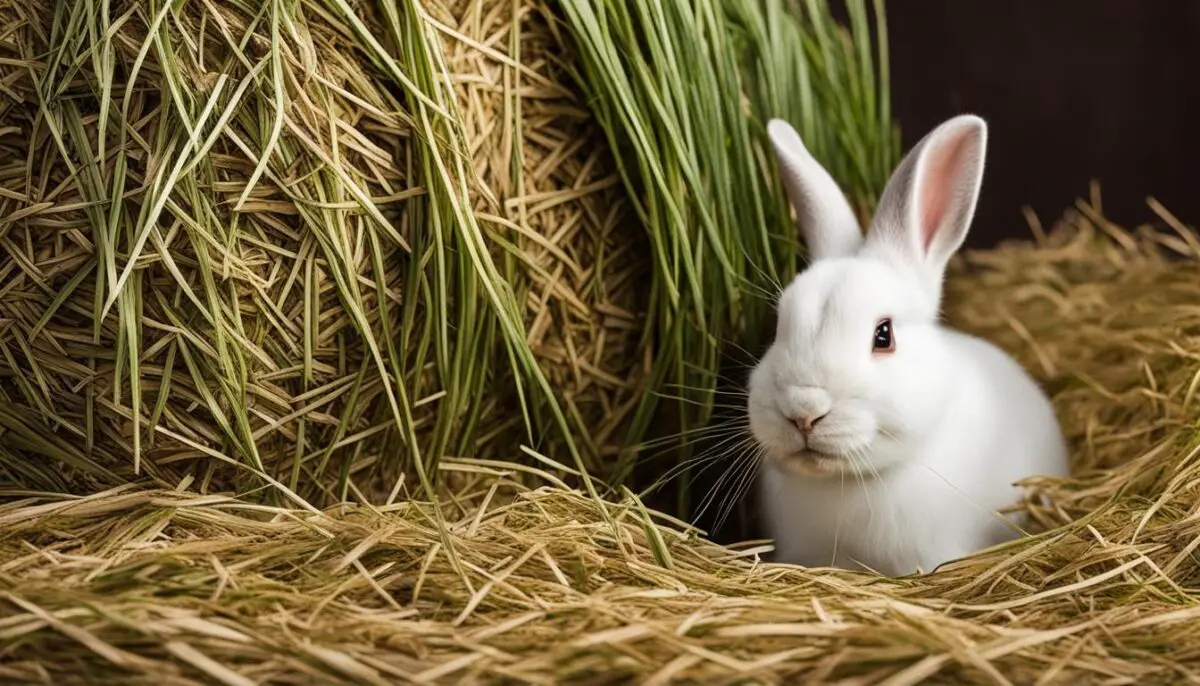
The Safety of Banana Peels for Rabbits
When it comes to feeding rabbits, it’s important to consider their nutrition and dietary needs. One question that often arises is whether rabbits can eat banana peels. Let’s explore the safety of banana peels for rabbits and the considerations to keep in mind.
Good news for rabbit owners – banana peels are safe for rabbits to consume! In fact, they can be a source of additional fiber in their diet. However, it’s crucial to offer banana peels in moderation due to their high fiber content.
Before feeding banana peels to your furry friend, there are a few important steps to take. First, opt for organic banana peels to avoid any potential exposure to harmful chemicals or pesticides. Wash the peel thoroughly to remove any residue that could be harmful or unappetizing for your rabbit.
When introducing banana peels into your rabbit’s diet, pay close attention to their response. Monitor their digestion and watch for any signs of digestive upset or discomfort. If you notice any adverse reactions, such as diarrhea or bloating, it’s best to discontinue feeding banana peels and consult with a veterinarian.
Conclusion
Rabbits can safely enjoy the occasional treat of bananas as part of their diet. However, it is essential to exercise portion control and monitor their response. The staple of a rabbit’s diet should always be hay, ensuring proper digestion and providing the necessary fiber for a healthy bunny. While fruits and vegetables, including bananas, can add variety and nutrients, they should be given in moderation to maintain a balanced and nutritious rabbit diet.
Remember to follow the guidelines for feeding rabbits bananas and take precautions to prevent any accidents or overindulgence. If you have concerns about your rabbit’s diet or health, consult with a veterinarian for expert advice. By providing your furry friend with a well-rounded diet and proper care, you can ensure their optimal well-being and happiness.
Keep in mind that rabbits have specific nutritional needs, and their diet should consist primarily of hay. While treats like fruits and vegetables can be enjoyable for rabbits, they should never replace the essential role that hay plays in their overall nutrition. So, next time you treat your rabbit to a small slice of banana, make sure to do so with care and moderation, while prioritizing their hay-based diet.
FAQ
Can rabbits eat bananas?
Yes, rabbits can eat bananas in moderation as an occasional treat.
What is the nutritional value of bananas for rabbits?
Bananas are packed with nutrients including calories, sugars, fiber, protein, potassium, vitamin C, and vitamin B6.
How much banana should I feed my rabbit?
A small slice of banana, no more than two times a week, is sufficient as a treat for adult rabbits. Baby bunnies should wait until they are older before being introduced to bananas.
What other fruits and vegetables can rabbits eat?
Rabbits can also enjoy cucumbers, celery, grapes, and cabbage as part of their diet. It’s important to introduce new foods gradually and monitor your rabbit for any signs of digestive upset.
Why is hay important in a rabbit’s diet?
Hay ensures proper digestion and provides the necessary fiber for a healthy bunny. Timothy hay, meadow hay, and orchard grass hay are excellent choices for rabbits.
Are banana peels safe for rabbits to eat?
Yes, banana peels are safe for rabbits to consume but should be offered in moderation due to their high fiber content. It’s important to opt for organic banana peels, wash them thoroughly, and observe your rabbit for any signs of digestive upset or discomfort.


